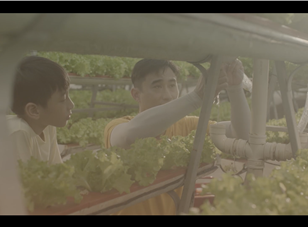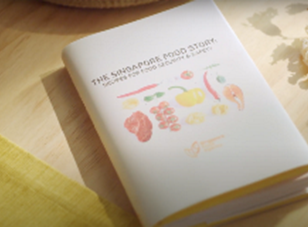Ensuring Singapore’s food security is a mission that everyone has a role and a stake in. In line with the Singapore Together movement, the Singapore Food Agency (SFA) has been actively engaging the industry and public stakeholders to co-author the next chapter of our Singapore Food Story. Here’s what we have written together so far:
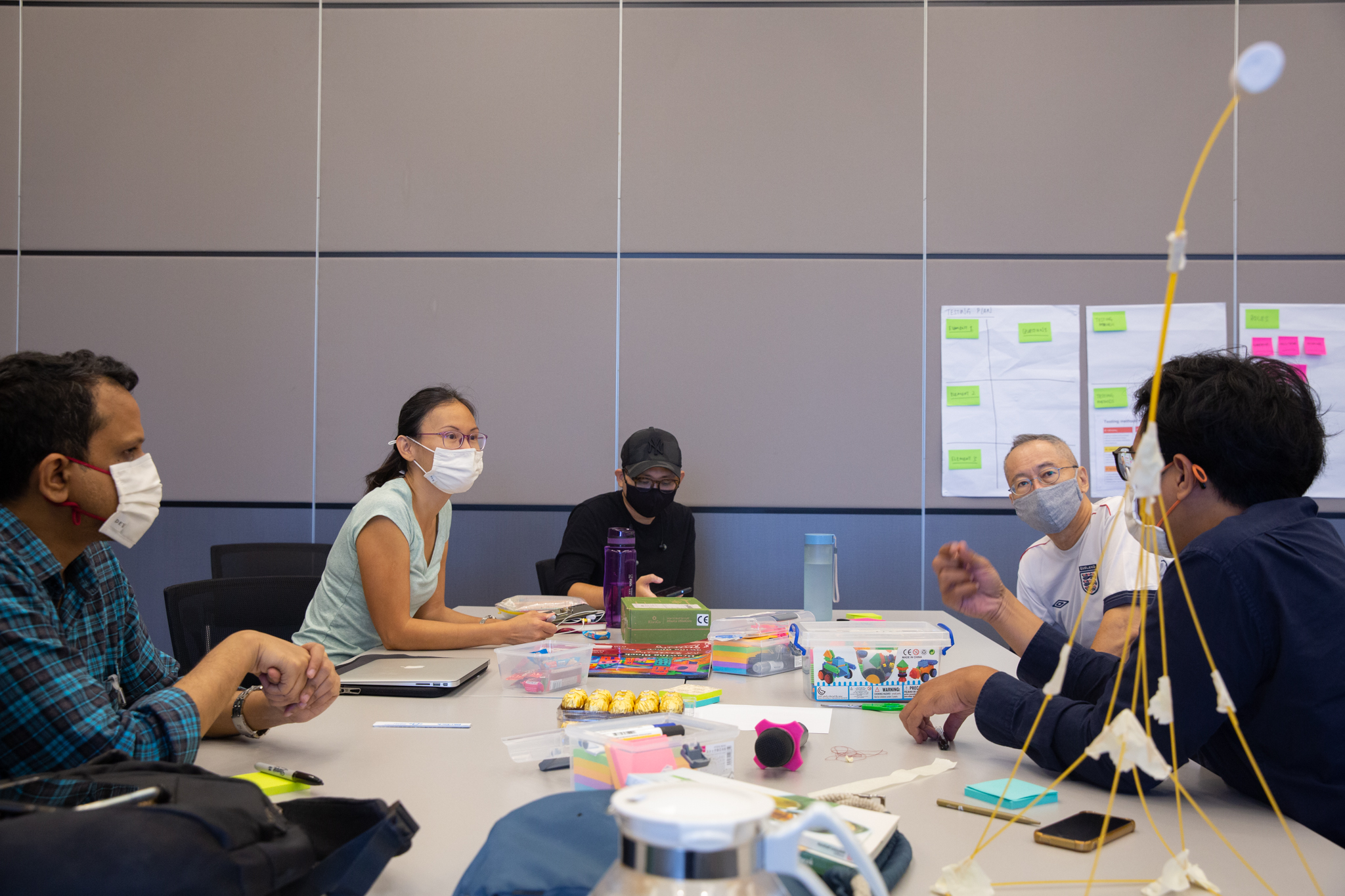 Participants of the Citizens' Workgroup on Increasing Demand for Local Produce deep in discussion.
Participants of the Citizens' Workgroup on Increasing Demand for Local Produce deep in discussion.
When it comes to ensuring Singapore’s long-term food security, SFA has set an ambitious ‘ 30 by 30’ goal. Currently, with just 1% of land available for agriculture, building the capability and capacity of the nation’s agri-food industry to produce 30% of our nutritional needs locally and sustainably by 2030, is no mean feat.
To do this, SFA is working closely with the industry to transform the agri-food sector into a highly productive, climate-resilient and resource-efficient one. We are also redeveloping the greater Lim Chu Kang (LCK) area into an agri-food cluster to optimise farmland food production to grow more with less.
The launch video for the LCKMP Stakeholder Engagement Series - inspiring our people to not just feed today, but also our future.
But just as it takes a village to raise a child, it takes a nation to feed our people. To ensure that our local farms are sustainable and can bolster our country’s food security, we not only need the support of the industry, but the public as well.
Hence, in the spirit of Singapore Together to partner Singaporeans in shaping our shared future together, SFA embarked on two stakeholder engagements to address two key challenges: 1) How can we get more consumers to buy local produce so as to incentivise our local farmers to improve their productivity? 2) How can we co-create a vision for the future LCK agri-food hub that is vibrant, innovative, sustainable and accessible to all?
SFA actively engaged stakeholders from diverse backgrounds and expertise to seek ideas and more importantly, to co-create solutions and write the next chapter of the Singapore Food Story together.
Seeking views
SFA’s first foray into co-creating solutions with the public was the Citizens’ Workgroup (CWG) on Increasing Demand for Local Produce. From July to October 2020, fifty citizens from different walks of life came together to develop creative ways to encourage more Singaporeans to eat and buy local. The Workgroup members came up with six proposals and prototypes after six sessions held over four months, and proudly presented their final recommendations to Ms Grace Fu (Minister for Sustainability and the Environment), Dr Amy Khor (Senior Minister of State) and Mr Desmond Tan (Minister of State).
Watch for the journey participants took on the Citizens' Workgroup on Increasing Demand for Local Produce.
The second is the recently concluded Lim Chu Kang Master Plan (LCKMP) Stakeholder Engagement. As a part of the SG Green Plan 2030 initiatives, the LCKMP engagement reached out to over 300 industry, stakeholders and members of the public to co-create ideas to develop 390ha of Lim Chu Kang into a ‘grow-learn-play’ agricultural powerhouse that would amp up food production in a sustainable manner on limited land.
Coming from a wide spectrum of professions, industries and backgrounds, participants comprised farmers, educators, nature groups, ecosystem players, members of the public, and public officers. Helmed by Minister Grace Fu and Minister of State Desmond Tan, they got together over several sessions from May to October 2021 to exchange views and develop ideas on how Lim Chu Kang can be transformed into Singapore’s flagship agri-food production hub of the future.
Find out what went down for Phase 1 and 2 of the LCKMP engagement journey!
The ongoing COVID-19 pandemic, with its restrictions and safe distancing measures, also challenged us to redesign how we conduct such stakeholder engagements. Experimenting on the go, the organising team tried out innovative ways to encourage collaboration between participants, through a mix of online brainstorming sessions as well as physical small group meet-ups.
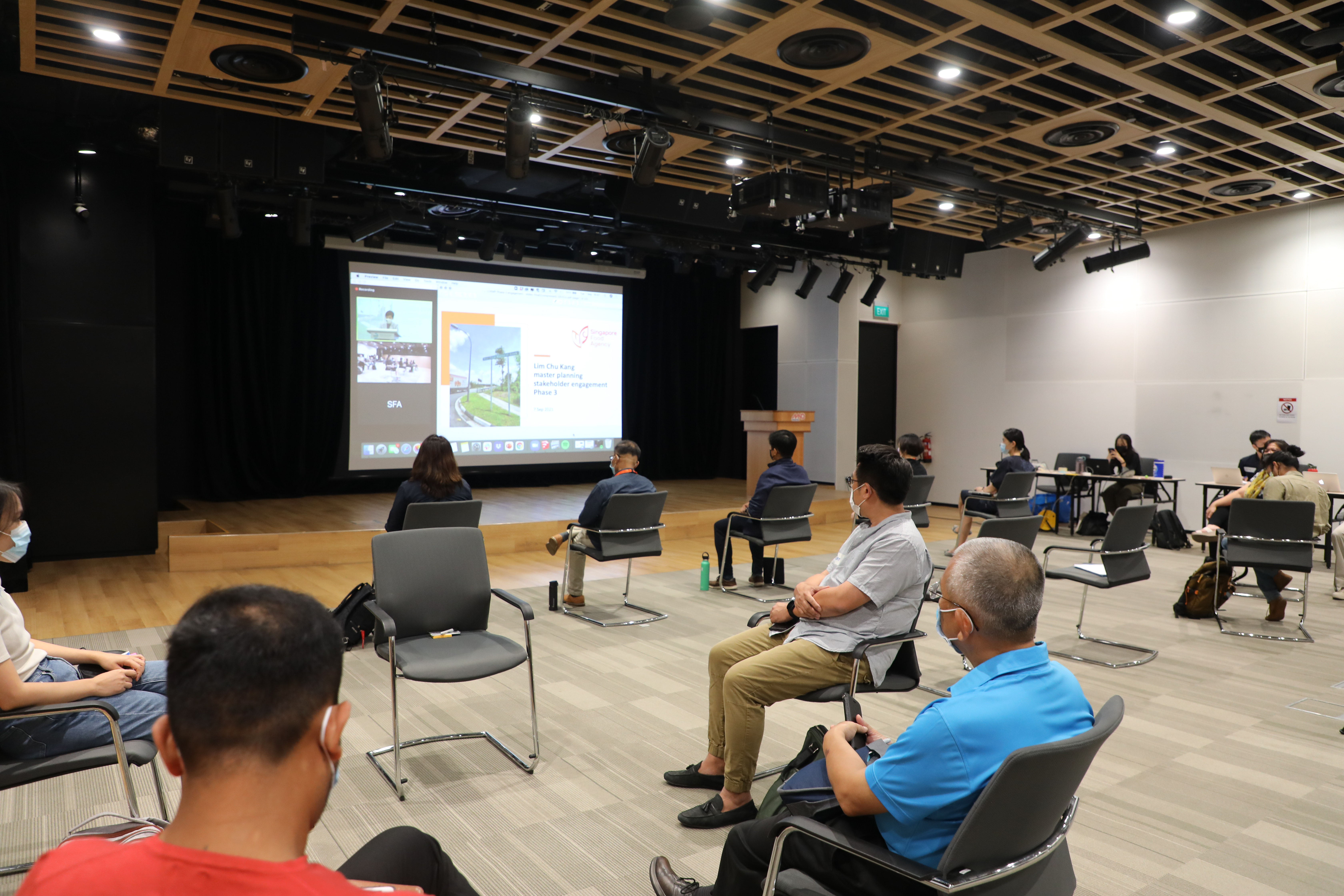 Participants using Zoom to view the Minister’s welcome speech and SFA’s presentation, as part of a hybrid engagement mode for the first session of LCKMP Stakeholder Engagement Phase 3.
Participants using Zoom to view the Minister’s welcome speech and SFA’s presentation, as part of a hybrid engagement mode for the first session of LCKMP Stakeholder Engagement Phase 3.
Virtual meetings were convened using digital conferencing tools and collaborative platforms. Project members also shared ideas on MURAL boards and WhatsApp groups, and prepared proposals through Google Drive. In a fitting coda, the Citizens’ Workgroup participants even broadcast their final proposals on Facebook Live!
Redesigning the rules of engagement
Pivoting to new ways of stakeholder and citizen engagement was not always smooth sailing. Like everyone else transiting to working from home or Home-based Learning arrangements, organising engagements with its new virtual-physical hybrid modality also hit a few snags.
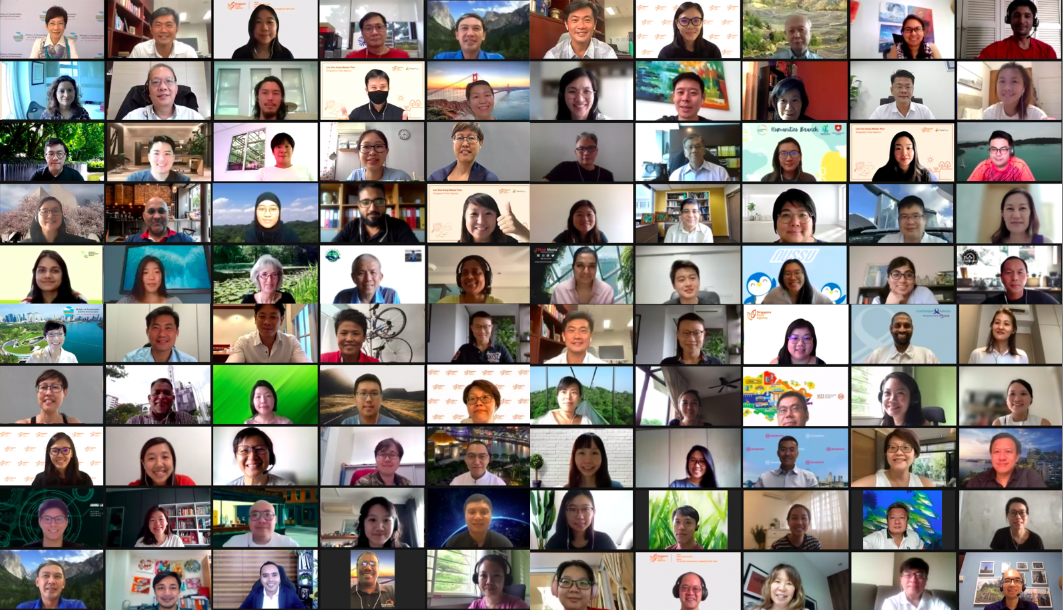 A group shot of one of the many Zoom collaborative sessions. Fun fact: Phases 1 and 2 of LCKMP Engagements were conducted online entirely!
A group shot of one of the many Zoom collaborative sessions. Fun fact: Phases 1 and 2 of LCKMP Engagements were conducted online entirely!
While video conferencing tools facilitated discussions and virtual collaborative platforms enabled active participation, not everyone had the same level of comfort or proficiency with such digital tools.
Online communications could not replace the bond that is formed from face-to-face engagements, which is essential when it comes to intensive deliberations and prototyping engagement sessions.
To enhance participants’ knowledge of the agri-industry and lend depth to the discussions, industry experts from farms, supermarkets, online retailers and associations came together to share their know-how virtually. The organisers even arranged a virtual vegetable farm “tour” to replicate immersive on-site visits. Armed with such vital information, participants were able to dive straight into the heart of their discussions.
Finding common ground
Video conferencing aside, organisers and facilitators also had to be mindful to constructively channel the diversity of ideas as participants tackled the issue at hand.
In the case of the Lim Chu Kang Master Plan Phase 3 sessions, four topics based on Environment, Experience, Engagement and Economics were introduced to frame the discussions. These 4’Es’ form the core development areas that SFA is looking into for the LCK area. Participants formed five discussion groups with each working on their preferred 'E' topic. By breaking down the problem into manageable parts, they focused their energies on prototyping specific solutions for the overarching fifth ‘E’ – building the Lim Chu Kang Ecosystem.
Watch to find out what ideas each group proposed for their 'E'!
Just like any marketplace of ideas, dealing with divergent views was par for the course. The SFA team learned to adopt a listening stance and keep communication channels open so that different stakeholders could understand and appreciate each other’s positions. Knowing that their voices were heard also helped to build trust and deepen the partnership between the industry, public and SFA. That, at its essence, is the value of stakeholder engagement.
Taking part in the stakeholder engagement has really helped because we have been able to communicate some of the stresses and difficulties that the industry faces, as well as understand better some of the reasons why certain policies are done and communicated in certain ways.
Piloting the Next Phase
With the successful conclusion of the two stakeholder engagements, SFA is now working with the Citizens’ Workgroup members, as well as stakeholders and other industry partners to carry the initiatives forward.
For the Citizens’ Workgroup, SFA is working with stakeholders to pilot two proposals – the first proposal is the design of hospital meals for postpartum mothers using locally-grown produce, while the second seeks to increase awareness and visibility of local produce in wet markets. By facilitating connections and meetings between the CWG participants and various stakeholders, SFA managed to get buy-in and interest from local businesses, farms and markets. The projects are expected to be launched in 2022.
Following the Lim Chu Kang Master Plan Stakeholder Engagement, a tender to appoint a multi-disciplinary consultancy team to carry out the master planning has been launched in mid-December.
Check out our microsite for updates on major project milestones as the reimagined LCK comes to fruition!
What could the future LCK look like? Watch to discover the possibilities!
While these stakeholder engagements have accomplished much, the Singapore Food Story has only just begun. Guided by the conversations and ideas generated, the future of Singapore’s agri-food industry is filled with possibilities. As we start 2022, join us in writing the next chapter of the Singapore Food Story and contribute to Singapore’s food future together!
Learn more about the Citizens’ Workgroup on Increasing Demand for Local Produce and the Lim Chu Kang Master Plan Stakeholder Engagement and support our local farms!



